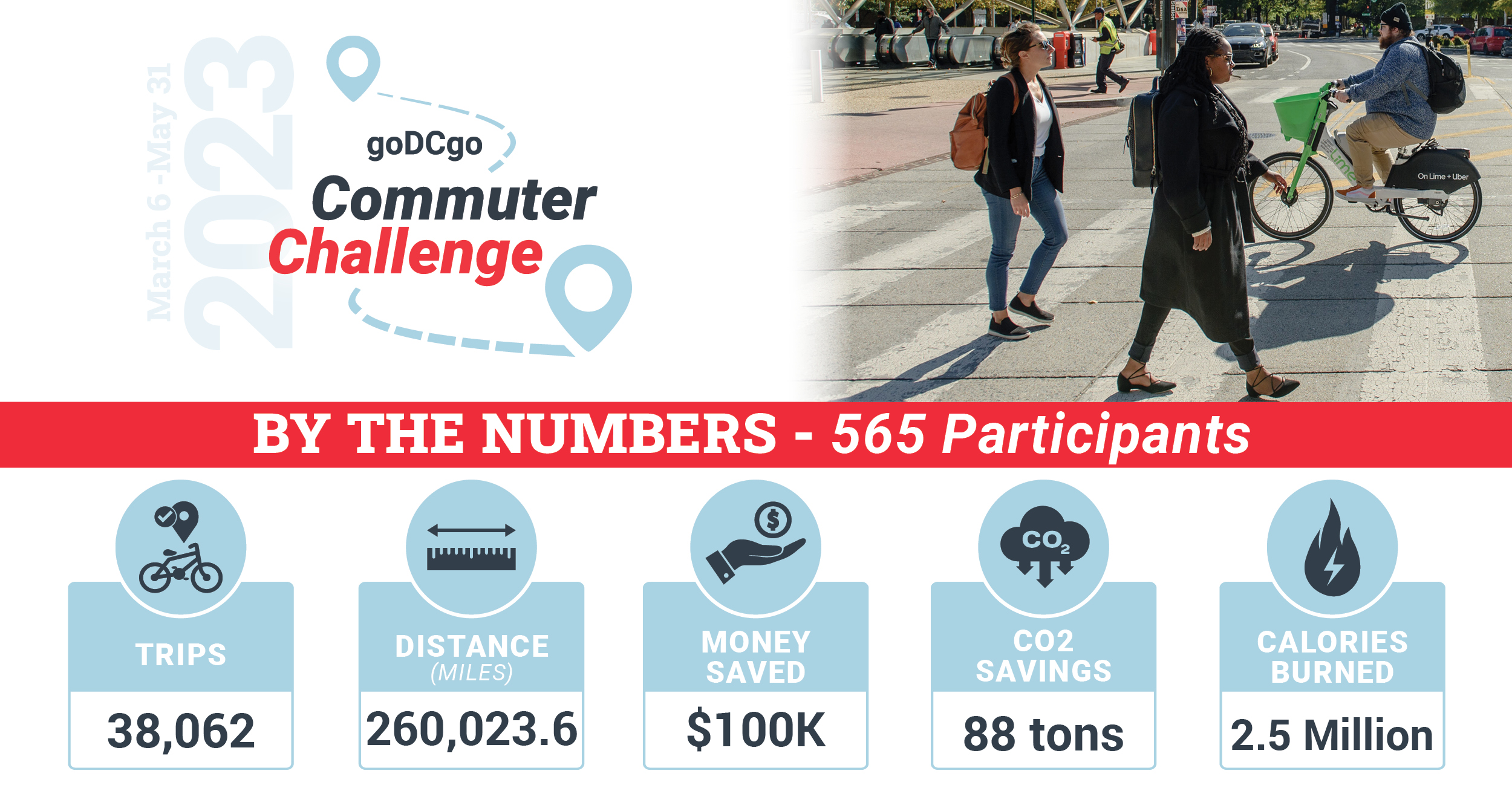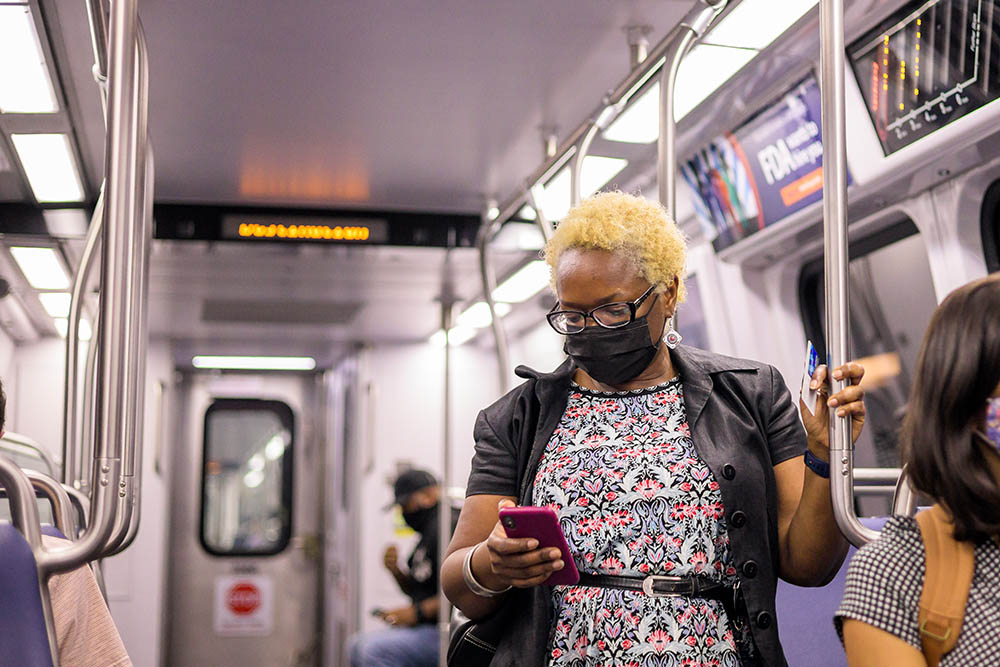With the DC Parking Cashout Law reporting deadline approaching on January 15, 2025, employers across the District are asking: do I need to report my compliance this year and what do I report? This reporting cycle, all District employers with 20 or more covered employees* need to report....
A big thank you to everyone who participated in our 2023 goDCgo Commuter Challenge. Over the last three months challenge 565 participants logged 38,062 sustainable trips; reducing 88 tons of CO2 in the District, burning 2.5 million calories, and saving $100,000 collectively. Choosing to commute around the District sustainably may seem like a small effort but together these choices have a huge impact! Thank you to our challenge participants for doing their part to help DC become the healthiest, greenest, and most livable city in the nation! Sponsors! Another big thank you to our sponsors! Without them we couldn't have had such a fun an amazing commuter challenge. From free food coupons and complimentary dinners to staycations and sporting event tickets, our sponsors provided us with amazing monthly prizes....
With the January 2023 DC Parking Cashout reporting deadline in the rearview mirror, it’s time for employers to start preparing for what’s to come. The next step for employers varies based on which compliance option your organization chose. To help you navigate your next steps, we’ve outlined below what you need to do over the next year for each compliance option and exemption, and for those organizations that missed the deadline....
To continue to improve air quality and traffic congestion in the District, the Transportation Benefits Equity Amendment Act of 2020, also referred to as the DC Parking Cashout Law, was signed into law by Mayor Bowser in April 2020. This law encourages sustainable transportation use and aims to reduce the number of commuters driving alone to work in the District. Read on to learn about the most important things you need to know about this law. ...
Read the latest report from the UK's Four Day Work Week trial published Feb 2023 As many employers have transitioned back to the worksite, the four-day work week has become a popular topic. In fact, the number of ZipRecruiter jobs that mention four-day work weeks is up 67% this year. This comes as no surprise to employers watching the trends, as 66% of US workers report wanting to work fewer than 5 days a week, and 85% approve of moving to a four-day work week. In addition to the four-day work week’s favorability among employees, there are many pilots occurring globally in the United Kingdom, New Zealand, and some in the United States that are showing the four-day work week is beneficial for companies and management; reporting increases in productivity, greater ability to attract and retain talent, and improvements in company loyalty....
According to ADP Research Institute, 64% of workers would rather quit their jobs than return to an office full time. For anyone who’s been following the shift to remote work over the past two years, this should come as no surprise. Working from home has saved employees time and money, and maintained productivity. However, some employees still yearn for the social aspect of the office and worry about missing out on promotions and leadership roles without the office setting. This is where a hybrid schedule can give employees and managers the best of both worlds. Thankfully, 35% of DC employers are listening to their employees and are working to create and implement hybrid work schedules as employees return to the office this summer. But transitioning to a hybrid schedule isn’t as easy as you may think. For a smooth transition, employers need to audit their policies and consider that after two years of working from home, pre-pandemic in-office policies can’t just be resurrected without evaluation. Companies need to assess their new hybrid work situation and address the challenges it brings regarding commuter benefits, regional emergency ride programs, and complying with local DC transportation ordinances. Creating a new hybrid policy from scratch may sound like a heavy lift, but if you follow our list of items to consider below, you’ll be off to a great start. Be Clear About When and Why Employees Should Be in Office About 38% of hybrid employees say their biggest challenge in the past few months was knowing when and why they should come into the office. Is this something you have outlined in your hybrid work policy? Possibly not, as only 28% of leaders report including it in their policies. Make sure you have clear and direct instructions on when employees should come into the office. Should they be in for important meetings? On a certain day? If they need to access certain equipment? Use examples and include the “why” behind these in-office requirements. Make Sure You’re Still Compliant with DC Laws DC has two local ordinances that apply to employers in the District: the DC Commuter Benefits Law and the DC Parking Cashout Law. If you meet the base qualifications of these laws, you must comply with them even if your employees are on a hybrid work schedule. Our employer team can help you navigate and comply with these laws. Supplement Guaranteed Ride Home The regional Guaranteed Ride Home program, run by Commuter Connections, requires employees to commute by transit, carpool, bike, walking, or scooter at least two times a week to qualify for the program. For many only going back to the office 1 day a week, they are unable to use this benefit. If you have employees who only work from the office one day a week, you can supplement the regional program by covering rides for unexpected overtime and emergencies. Talk to our employer team to learn how. Remind Employees About Commuter Benefit Flexibility Unlike other health care, commuter benefits aren’t restricted to open enrollment. Although most admin and HR departments are aware of this, your employees may not be. Make sure you remind your employees regularly that they can enroll, adjust their allocation, or pause their commuter benefits at any time. Fully Subsidize Transit Costs to Encourage In-Office Work If your office is operating on a hybrid schedule but management would like employees to come into the office more frequently, fully subsidizing transit costs can help you achieve this goal. By fully subsidizing transit costs, you remove one of the barriers of coming into the office. This can easily be done through WMATA’s SmartBenefits system, and the best part is that this type of transit subsidy will be refunded to you if not used. Encourage a Variety of Sustainable Commuting Options Fear of taking public transit due to COVID-19 has led to many workers choosing to drive to work when they would normally take transit pre-pandemic. It’s important to let your employees know they have options like carpool apps, biking, or walking. You can even encourage these behaviors through a bike subsidy/monthly bike benefit, walking benefit, or free parking for carpools. Our employer services team can help you set up benefits and incentives like these....
Read our newest blog for updates on reporting and FAQs. To continue to improve air quality and reduce the number of commuters driving to work in the District, an amendment to the Sustainable DC Omnibus Amendment Act of 2014 was signed into law by Mayor Bowser in April 2020. The new law titled the Transportation Benefits Equity Amendment Act of 2020 requires all employers who offer free or subsidized parking benefits and have 20 or more employees to comply with the law and submit a report to DDOT. New regulations can be confusing for impacted businesses and goDCgo is here to help your organization become compliant. ...
This blog references DC Circulator. Please note, as of 1/1/2025, DC Circulator no longer provides bus service. In honor of this year's Black History Month, goDCgo wants to shine a spotlight on some of the African American leaders and professionals who help shape transportation in the District today. From city infrastructure, sustainable transportation promotions, transit operations, vehicle management, road safety, bike education, and much more, they're involved in nearly every aspect of DC's transportation systems and make a strong impact on the commute options that we use every day including Capital Bikeshare, DC Circulator, Metrobus, Metrorail, and even personal bike riding experiences....
Do you work hard as an organization to ease your employee’s commutes through commuter benefits, on-site amenities, and promotion of sustainable transportation? If so, goDCgo and Best Workplaces for Commuters are here to help you get the recognition you deserve and showcase your organization as a leader in sustainable transportation....
Over the past year, telework has certainly provided value as a safe alternative work arrangement in response to the coronavirus (COVID-19) pandemic. Whether it’s one day a week or every day, teleworking can save you time and money, reduce air pollution, and even help stop the spread of COVID-19. We understand that many people can’t telework due to the nature of their job and recognize that the telework experience differs from that of pre-COVID times, however, we encourage everyone to take time for wellness which can start with recapturing the personal time that commuting to the office previously offered....













